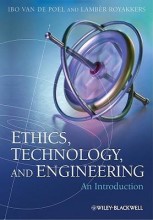Summary: Ethics, Technology, And Engineering: An Introduction | 9781444330953 | Ibo van de Poel, et al
- This + 400k other summaries
- A unique study and practice tool
- Never study anything twice again
- Get the grades you hope for
- 100% sure, 100% understanding
Read the summary and the most important questions on Ethics, technology, and engineering: an introduction | 9781444330953 | Ibo van de Poel; Lamb?r Royakkers
-
1 The Responsibilities of Engineers
This is a preview. There are 18 more flashcards available for chapter 1
Show more cards here -
What is a common distinction of Responsibility?
- Active Responsibility
- Passive Responsibility
-
What is Active Responsibility?
Responsibility before something has happened referring to a duty or task to care for certain state-of-affairs or persons. -
What is Passive Responsibility?
Applicable after something (undesirable) has happened. Backward-looking responsibility. -
What is Role Responsibility?
The responsibility that is based on the role one has or plays in a certain situation. -
What is Moral Responsibility?
Responsibility that is based on moral obligations, moral norms and moral duties. -
What is Professional Responsibility?
The responsibility that is based on one's role as professional in as far it stays within the limits of what is morally allowed. -
What are the specific forms of Passive Responsibility?
- Accountability
- Blameworthiness
- Liability
-
What are the Four Conditions that need to apply in order for someone to be Blameworthy?
- Wrong-doing
- Causal contribution
- Foreseeability
- Freedom
-
What are the five Features of Active Responsibility according to Bovens?
- Adequate perception of threatened violations of norms
- Consideration of the consequences
- Autonomy
- Displaying conduct that is based on a verifiable and consistent code
- Taking role obligations seriously
-
What is Professional Ideals?
Ideals that are closely allied to a profession or can only be aspired to by carrying out the profession.
- Higher grades + faster learning
- Never study anything twice
- 100% sure, 100% understanding

































